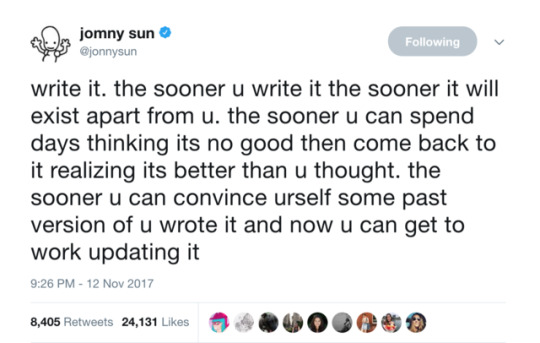Note
Hey I’m also in APUSH, do you have any tips you use for studying (especially in regard to the big final)? Cuz even tho it’s getting close to the end of the semester I could really use some advice for how to I guess remember everything from last semester and this semester. If you answer, thank you so much
1. Look up Jocz videos on YouTube and take unit notes at the beginning or end of every unit
2. Make sure you keep up with your homework
3. Ask questions in class and write down anything you want to remember
4. This may not apply to you but my teacher makes us put together a portfolio of all our assignments for the unit so it’s important for us to stay organized
5. Try not to miss school. For me, my AP classes are in the afternoon so I schedule all of my appointments for the morning
6. Study with your friends
7. I also have a specific way I take notes for APUSH so try finding what works best for you
8. It’s okay to not be constantly working on APUSH
5 notes
·
View notes
Text
self-care instruction manual
forgive yourself : it’s okay if you didn’t wake up early, go for a run, or finish that assignment. you’re only human
start slow : don’t set your expectations too high when you’re just starting off
keep learning : getting to where you want to be is a process. don’t expect perfection overnight
be kind to yourself : you’ll make mistakes along the way, but don’t let that stop you
65K notes
·
View notes
Text
Annotating Effectively
Not to brag, but if there is anything I have mastered so far in my high school career, it is the art of annotating poetry and prose for close text analysis. This guide will focus primarily on close-text analysis, but will also touch on a full annotation of a larger piece. Basically, I will be giving you a few different techniques given to me by my English teacher, as well as a few that I have learned on my own! Enjoy!
{ Some of the names are weird because my english teacher is a hilarious person! }
Coondog
What: Basically coondog is all about “sniffing out” motifs and symbols. So for example, when reading a series of poems, if you realize there is a lot of references to the ocean, go through from the beginning with a highlighter and highlight every single reference to the ocean you can find – whether it literally mentions something like “waves” or “fish”, or is far more subtle.
Why: Using coondog is extremely helpful, especially as writing about a motif is a great starting point for an essay or paragraph. If you are in the IB program, motifs are awesome for anything from an English extended essay to your unseen oral commentary. Remember, a motif can vary! Some examples of some I have seen commonly are: water, corporeal, animals, time of day, cosmic, textile, etc.
My English Teacher came up with the name (I think it comes from one of her crazy life stories haha)
WWWWWH
Who: Who are the characters? What is the point of view?
What: What happened in the piece (paraphrase)?
Where: What is the setting? How does the setting effect the piece?
Why: Why did the author do _______?
When: When was the piece written?
How: How does the author create the feeling of ________?
Read Aloud Silently
What: This is basically just making sure you hear the piece in your head as you read it. This is extremely important while reading poetry.
Why: Reading aloud silently will you help you catch so many things you wouldn’t by just skimming through it. Things like internal rhyme, rhythm, onomatopoeia, tone, consonance/assonance, cacophony/euphony, etc. will all become more obvious. This also ensures that you don’t skim past a line or anything.
Even if you hate every single other tip I have given you, just use this one and you will benefit incredibly.
TIPCASTT
Title: Read the title before reading the piece. Is it an allusion? What does it connote? Does it reveal anything about the novel?
Irony: Look for irony and humour in the piece. Both are excellent to write about, so keep your brain peeled!
Paraphrase: After you finish reading everything, think about what literally happened in the piece. Do this before finding the ‘sub-text’.
Connotation: Time for sub-text! What is the piece saying indirectly? As in what is it trying to reveal other than the literal happenings of the work? Ladies and Gentlemen, it is time to read underneath the lines!
Atmosphere: Highlight anything that reveals the tone/atmosphere of the piece. Highlight any hints you find that make you think the story is shifting in one way or another.
Shift: Find any narrative shifts. This could be anything from a shift in tone, to a shift in point of view, to a shift in the characters feelings.
Title: Now that you have examined the piece, look back at the title and think about it’s relevance. Were you right when you looked at it the first time? Or did it reveal a hint about the ending?
Theme: Now it’s time to put it all together! What is underneath the piece? What is the author trying to convey? Remember the theme will often be something profound and important!
BE
Beginning & End
Never skip your beginning and ending as I personally feel as if they are perhaps the most revealing sections. The beginning will set the tone and mood for the poem, while the end will ultimately reveal the theme. When examining the beginning and end, one way to comprehend what happened in the piece is to map out where it started, and where it finished, and fill out (with quotes) how the narrator/characters got there. This is most helpful with poetry or prose excerpts as novels would have wayyyyy to much going on in the middle.
Feeeeeeelings
Poetry has feelings. Yup. That’s a thing.
So, remember, atmosphere and tone are incredibly important. Write down how the poem makes you feel, how the poet might have felt when they were writing it, how the characters/speaker feels about the situation – any feeling word that comes to mind will be significant when you talk about the atmosphere of the overall poem! Plus it will give you a more thorough understanding of the premise :)
Handy Dandy Things to Watch For!
Bored of talking about Simile’s and Alliteration? Here are some other things (often a little more rare) that are almost always relevant when annotating poetry (and a lot of prose as well!)
Allusion: I promise you, there is almost always allusion in poetry. Biblical will probably be the most common allusion you see (in Western literature), and it is extremely easy and effective to talk about it. Allusion to mythology is also common, and is often used in order to show the universality (through space and time) of a specific theme.
Elevated/Archaic Language: Always keep an eye out for this, it is extremely
Parallel Structure/Anaphora: You can never go wrong with parallel structure and anaphora as they will exist often! It doesn’t have to be a perfect parallel structure, it always elevates and intensifies a piece of poetry or prose.
Structure: In poetry especially, sentence/stanza structure is extremely significant. Look at the length of each line? Is it short-long-short-long line structure for the first few stanzas and then all of a sudden just a rhyming couplet of two short lines? Mention this! Talk about why this might be. Also keep an eye out for the actual structure of the stanzas on the page! This is not on accident, poets often put thought into the way it will look printed out. Plus, if you are unsure, you can always say “perhaps” to keep yourself save. Remember rhythm, syntax, enjambment, and general structure are your friend!
My Method (close-text, small section) ~ This is how I annotate for unseen timed commentary’s (but it is effective for all annotation!)
Read aloud silently.
Write down the general tone/feeling I get from the piece.
Read second time focusing on a possible theme.
Underline any poignant/interesting/beautiful imagery (as guess what, this is usually the best stuff to talk about in your paper!)
Write down a tentative theme and/or thesis (just off of what you get out of the poem the first time around – don’t worry, this isn’t permanent!)
Why did you pick that thesis/that theme to work with? Think of 2+ points that support your thesis.
Highlight any quotes that support these points.
And there you go, a body for your essay is completed.
Annotate with more specific notes towards each highlighted section. This is when you think of literary techniques used like simile, alliteration, onomatopoeia, etc.
For a Whole Book / Set of Poems:
As you read the book, highlight any interesting/potentially useful quote.
Let’s say you finish reading for the day after an hour. At that point, open a word document (or notebook), and record every quote you have found in different categories (include page numbers!!!!!).
Categories could be things like: John Doe’s Character Exposition, Water Motif, Setting & Context, etc. etc.
There are a few perks to doing this. First of all, you have all your quotes sorted, chronologically. This means that when looking at something like character development, you have a list of interesting quotes in the order of them happening thus basically creating a skeleton of their character arc! Second of all, having quotes in a large word document makes it far easier to find them! You can use command-F (if on a Mac), and search for a specific word/quote. This way, you don’t find yourself wasting time tracking down one tiny detail for an essay. Another perk is that by recording a few chapters wort of quotes at a time, you won’t be overwhelmed by hundreds of highlight marks throughout your book after you have finished reading. This basically ensures that once you have finished reading, all you have to do is sit down and write! No more spending hours searching for that one perfect quote in a 400 page novel!
12K notes
·
View notes
Text
a list of small study tips
these are small things you can add to your day to be 10% more productive with the estimated time it’ll take! these are things i do (or try to do) most days. they’re small enough to feel manageable, and i for sure don’t use all of them but i find that when i use at least 2-3 in a day i feel a lot better about the material.
retype notes in google docs (10-15 min/1 hour lecture)
Utilize pomodoro technique for at least one subject (25 min work/5 min break. total 30 min)
Look over notes before class (5 min)
Look over notes after class (5 min)
Make notecard summary after class (i find this one especially useful for calculus!) (10 min/notecard)
Explain short concept to a friend (10 min max)
write down to-do list of tasks (5 min)
Go over concepts in your head on your walk to class (absolute FAVORITE because of my daily calculus quizzes within the first 10 minutes of class) (as long as your walk is!)
i hope these are helpful, i need to learn more small tips myself too 😊
9K notes
·
View notes
Photo

Okay, so you’ve been called smart all your life. As a kid, you were one of the smartest in your class. Maybe you could read at a much higher level than your peers, or you could fly through multiplication drills like they were nothing. Then, you get to high school and suddenly you’re surrounded by lots of people who were ‘gifted kids’. None of what made you ‘special’ seems all that important now. Your work is actually challenging, and it’s actually requiring effort.
If you’re experiencing this, just know that so many students have gone through the same thing. Maybe it happens in high school, maybe college. But a lot of us who were considered gifted as kids suddenly run into this and it challenges our entire identity. It can be paralyzing, but it’s 100% possible to overcome it and succeed! I’ve compiled a few tips for ex-gifted kids dealing with impostor syndrome and self-doubt. I’m not a therapist, psychologist, or any sort of education expert. I’m just speaking to my own experiences, and I welcome any input from others who have insight into this as well!
1. Understand that working hard does not mean you aren’t intelligent. If something doesn’t come naturally to you, that’s not a reason to give up. Believing that people can do things “just because they were born with a talent for it” is only going to hurt you. It’s not true! People may have natural aptitudes for things, but hard work is involved even for the smartest or most talented people. You are capable of learning anything, and you don’t have to be “good at it” right away to do so.
2. Comparison will kill you. You are your only competition. Focusing on how you rank with other students, and comparing yourself to your classmates is going to exhaust you. By focusing on others, you can’t put your full energy into focusing on your work and yourself. You belong. Even if you struggle with your work, you belong. Focus on your own self-improvement and doing your best.
3. Don’t focus on the goal, focus on your current actions. If you’re always thinking about the future, and about whether you’ll get into that school or that program or win that award or get that scholarship, you’re not using that time to get work done. Don’t worry about college applications, just do your homework. Focus on what you are doing now to reach your goals so you can apply to schools with confidence later.
4. Your grades may not reflect intelligence, but they do reflect work ethic. Don’t let others convince you that grades mean nothing. They sure as hell mean a lot to colleges, and thinking that you should “reject the current education system” is not going to harm anyone but yourself. If you don’t feel like you’re learning anything in your high school classes, that’s all the more reason to want to get into a university that will challenge you. If you put effort into your work, it will not let you down. Your hard work will be reflected on your transcript. Don’t lose focus.
5. Talk to someone. Let people know if you’re struggling. It can be hard to feel like you aren’t allowed to identify as “smart” or to feel pressure to constantly compete and improve. I went to a highly competitive high school that pushed kids to cope in dangerous ways. This is not healthy and not okay. If you’re feeling overwhelmed you need to find healthy coping mechanisms. Speak with someone you trust and don’t let yourself spiral. Don’t try to self medicate. Your well being is always more important than your grades. Period.
6. Enjoy yourself. School may seem like hell, and you may feel like it will never end and you’ll always be stressed and worried. But high school is only four years, and you can do things during that time that you probably won’t ever again. Take advantage of things that seem fun, even if people think they’re nerdy or weird. Try and remind yourself that you’re lucky to have your education and you have the power to do great things with it. Don’t lose sight of your own ability and your bright future!
15K notes
·
View notes
Note
I’m a freshie taking AP Bio, HGAP, and PreAP precal and I’m lowkey freaking out. Any advice?
Hello there!!
My biggest piece of advice is remember your self love and self worth!!
Mushiness aside, make sure to get into study habits early in the year. Create schedules, checklists, and organize your work space. Create weekly time blocks to study and STAY COMMITTED. That’s definitely the hardest part, but it’ll pay off in the end.
When it comes to APHG and AP Bio (and most science and social study courses), get into the habit of taking good notes. Any method you’re comfortable with will do, as long as it’s effective. My personal favorite method of note-taking is doing basic bullet points in class and then summarizing them in Cornell notes later at home.
Good luck this year!
#AP classes#ap human geography#AP human#aphg#hgap#AP biology#AP bio#high school advice#high school classes#study tips#studyblr
13 notes
·
View notes
Note
Hi!! I’m a Junior in high school enrolled in AP Physics,AP Chemistry,APUSH, AP language, honors PreCalculus and science research. I have already taken APWH and gotten a 5, and my average is at a steady 96. My schedule feels like it’s pretty loaded and I don’t know if I should take AP Chemistry after all. I want to go to a prestigious college, but I don’t know if I’m should be like stretching myself this thin. I’m not sure if what I’m doing now is fine??
Thanks for the ask!! AP classes are a great way to really stack your transcripts for college, but I always say it’s best to not overload yourself. Your college would rather see you excel in fewer APs than do mediocre in many. If you think you can handle it, go for it, but also remember to care for your mentality too :) I took 2 APs my junior year and 5 my senior year, and I noticed I did better overall my junior year when I could focus on individual subjects a lot more.
If you don’t have an extra curricular, I would say pick up another one of those instead of an extra AP, colleges will like the balance of great AP scores and dedication to an extra curricular.
Good luck on all your APs, I hope you find this blog useful throughout your school year!!
1 note
·
View note
Text
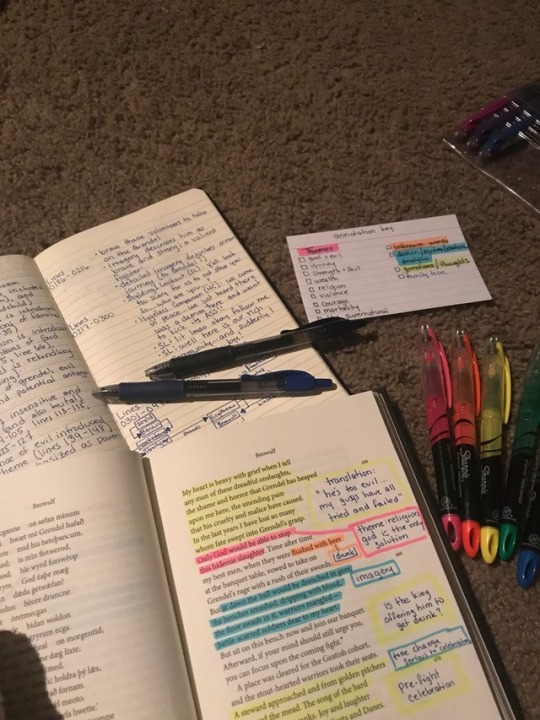
working on “beowulf” annotations...actually enjoying it a lot more than I thought I would 😅
#british literature#beowulf#ap language#ap literature#ap lang#ap lit#ap english#annotations#notes#highlight#homework#study#studyblr
81 notes
·
View notes
Text
The school year is starting soon!!
What classes are you guys taking this year? What classes are you most excited about? How about least excited?
2 notes
·
View notes
Text
New Account!
Hi everyone!
I am a former AP student and currently in college working on my Bachelor’s in Social Science Education and English Education with the hopes of being an AP teacher in the future.
I have created this account for two reasons:
1. I want to help current AP students slay their AP classes. AP can be one of the most strenuous parts of a high school student’s life. I remember how rough it was for even myself, but the perseverance and dedication I put in made it all worth while, and now, I want to extend some of that passion back to other students looking for similar results.
2. This account will act as my own personal studyblr as well, motivating me to work hard to help you, which, at the end of the day, is my true passion.
While I excel in English and Social Sciences, I am not opposed to helping out my Math and Science friends as well; whether they be tips, questions, or concerns. I want to make this a place really any student, even non-AP students, can come to for assistance, advice, or help. I might even be open to eventually expanding the blog to have multiple admins for multiple subject areas, if it proves successful enough.
I know it’s still summer break right now but feel free to give me a follow if you’re taking APs this fall (2018-2019 school year) as well as ask me things, message me, talk to me, etc. Let’s get you that 5!
#ap#high school#study#AP classes#AP scores#studyblr#study motivation#study tricks#apush#ap lang#AP history#AP euro#ap lit#ap literature#ap language#AP calculus#AP statistics#AP psyhology#AP calc#AP stat#ap psych#AP science#college credit#study help#study habits
2 notes
·
View notes
Text
How to study:

Before classes:
1 - Have a good night of sleep.
- At least eight hours.
2 - Take some coffee before going to school.
- Always have a snack in your bag. (Don’t study hungry)
3 - Workout.
- I know it’s going to be hard, since most of you have to wake up so early, but working out will help you to make the most out of your day.
4 - Organize your bag the night before.
5 - Go through what you’ll be learning on the day.
- This way you will be prepared and you can take notes about your doubts on the subjects.
6 - Listen to a badass playlist on the way to school/college.
- It will boast your motivation.
7 - Drink a lot of water.
- That’s a tip to the whole day, actually. Always remember to take a bottle of water or tea to school/college.
During class:
1 - Sit in the front.
- You will understand more your teacher and be away from the noises that can take away your attention.
2 - Ask questions. (No matter how dumb you think they are.)
- Do not end a class with doubts. If you can’t ask during the class, take a note of your question on a sticker/notebook to ask later.
3 - Record the lectures.
4 - Put stickers on notes you will need to go over.
5 - Listen to your teacher.
- Be friendly with them.
- Write down their names and contacts (number, emails, social media).
6 - Taking notes on class!
- Don’t worry about it being pretty, just make it organized and understandable so you can go over and make real notes later.
- Always start with the subject title and date.
- Differentiate by color your teacher’s notes and yours. Put in red (or any other color you want, actually) the important things.
After class:
1 - Eat.
- You need to replace energy!
2 - Review everything you learned on the day you learned it.
3 - Complete your homework on the day you get it.
- Or start it, if the task is too big.
- NEVER FALL BEHIND!
4 - Dress comfy.
5 - Have office hours in case you didn’t understand something.
6 - Watch documentaries on the topic you are currently studying.
7 - Study 30 minutes (50 minutes at the very most) and stop for 10 minutes.
- Leave your study place when it’s break time.
8 - Turn off your phone or let it out of sight.
9 - Test yourself/talk out loud.
- Do practice questions!
10 - Taking notes after class!
- Organize your notes by color.
- Rewrite the informations with your own words.
- When writing the new notes, make it pretty if you can. (I think it motivates me to study, looking at something well made) Otherwhise, be simple and objective, focus on the most important things.
- Go over the class recording and read the books to compare with your class notes, to make sure you didn’t forget anything.
10K notes
·
View notes
Text
the way my teachers talk about AP scores
1 is a D not great but not failing not unacceptable for something unchangeable
2 is a C you kind of know your stuff but lacked proper execution
3 is a B you know your stuff but gave lackluster execution
4 is an A you know your stuff your execution was fine but someone did better
5 is an A+++ you know all your stuff and are a god among men
11 notes
·
View notes
Text
Links to the AP English Language and Review Posts
BECAUSE I FINISHED THEM ALL. HIGH FIVE.
Review #1: Introduction to AP English Language and Composition
Review #2: Reading Comprehension (Multiple Choice)
Review #3: Writing Component : Synthesis
Review #4: Writing Component : Analysis
Review #5: Writing Component : Argumentative
Review #6: The Big Literary Eras and Movements
Review #7: The Big Rhetorical Devices
Review #8: “Canned” Examples You Should Know
Review #9: Vocabulary Words You Should Know
Review #10: Final Words and Best Wishes
3K notes
·
View notes
Photo
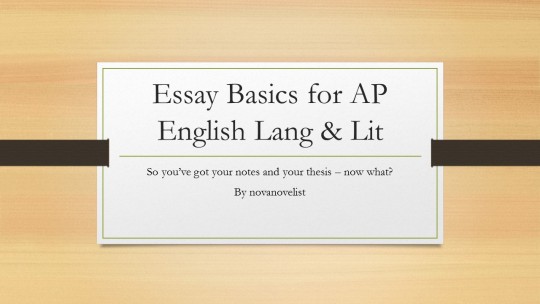
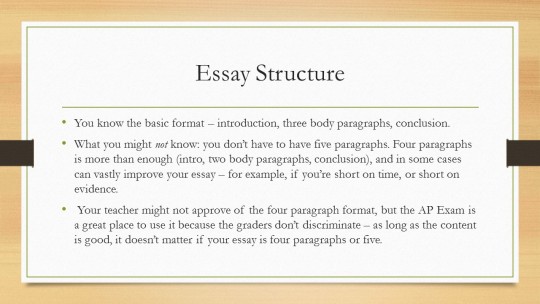
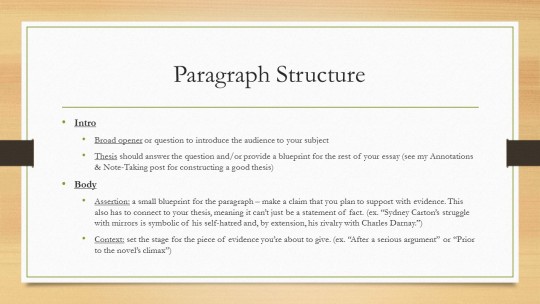


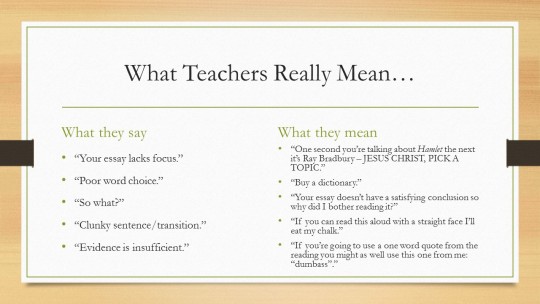


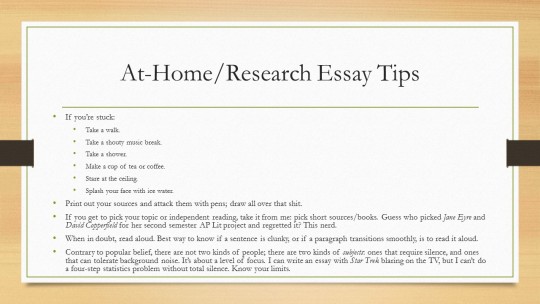
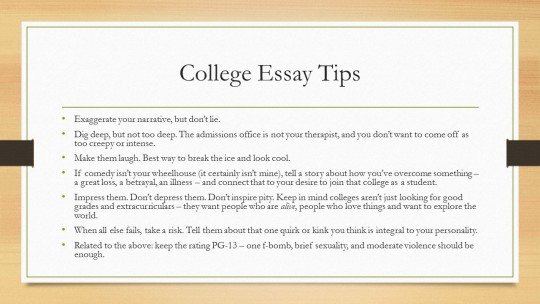
Essay basics.
See my previous powerpoint post on note-taking and thesis statements for additional advice.
Contact me if you need clarifications.
EDIT: With regard to paragraph structure, I was describing one body paragraph - assertion, context, evidence, commentary - with two slides. Don’t devote an entire paragraph to the assertion and context and another to the evidence and commentary - that’s a little nutty.
8K notes
·
View notes
Photo

Hey guys! Here’s some advice for writing that rhetorical analysis essay on the ap lang/comp exam in a few weeks:
intro paragraph:
This should only be 3-4 sentences long. Don’t spend too much time on it! Make sure you cover the SOAPS.
This is how I like to do it:
speaker, occasion, subject (1 sentence)
purpose (1 sentence)
audience (1 sentence)
thesis (1 sentence)
Your thesis should tell what you’re proving about the effects of the author’s techniques– it shouldn’t straight up list the techniques you’re discussing! Also, your thesis will ideally be a complex-compound sentence, which means it will have at least one dependent clause and two independent clauses. That makes your writing more sophisticated!
Here’s an example thesis (that I wrote for an analysis of a single paragraph):
���As Martin Luther King Jr.’s ‘Letter from Birmingham Jail’ addresses the criticism of his actions and defends his methods, his twenty-third paragraph declares his complaints against the intransigence of the white moderate, defining the white moderate’s innate complacency as the single greatest obstacle in the Negro pursuit towards freedom.”
body paragraph:
There should be 2-4 body paragraphs, depending on the length of the passage. Remember: go with the flow of the text, and don’t force yourself to write exactly 3 body paragraphs.
The paragraphs should be organized chronologically through the text, not by technique! This means sectioning the text by paragraph (1, 2, 3) or breaking it into parts (beginning/ middle/ end), depending on the format of the passage.
My body paragraphs generally follow this structure:
topic sentence- briefly describe what the paragraph is about. use transition words to identify the segment of the text you’re talking about
2-3 CSAs (basically examples)
claim: your position on the use of a rhetorical strategy
support: the quote, summary, or paraphrase of the text
analysis: explain how the strategy enhances the meaning and purpose of the text
synthesis to tie together the examples and state how they work together
closing sentence
Limit yourself to 2 strategies per paragraph to keep your essay focused. When writing under time constraints, I tend to be able to provide 2 examples of one strategy and 1 example of a second strategy, per paragraph, but that’s not a hard and fast rule.
conclusion paragraph:
Make this short and relevant. You’ll still have one more essay to go after this!
restate your thesis using different wording (1 sentence)
call to action, reflection, or extension (2-3 sentences)- it can be any of the following:
ask readers to evaluate the message of the piece
ask readers to agree with writer’s purpose
ask readers to examine how message is pertinent in modern-day
ask readers to reflect on the appropriateness of the piece in modern-day
another closing idea
2K notes
·
View notes
Photo
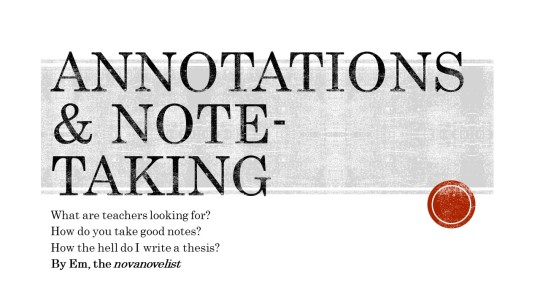
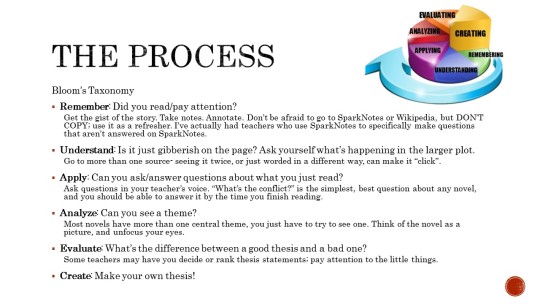


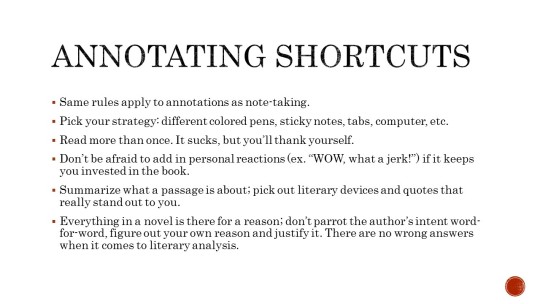
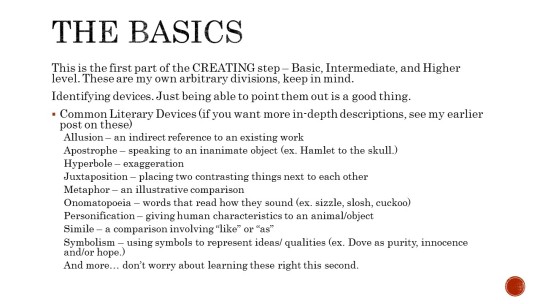


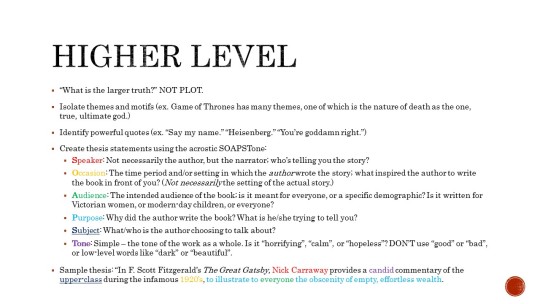
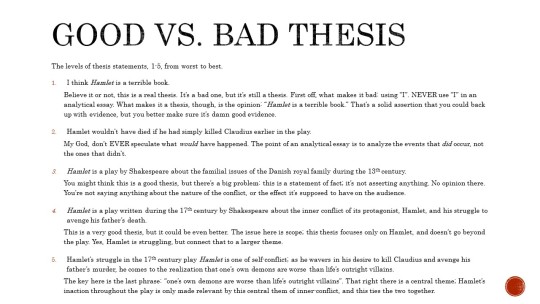
Adapted from a workshop I did at my high school Writing Center. One of my more helpful powerpoints; let me know if you need any clarifications. This is all my original work; please don’t remove the source.
16K notes
·
View notes
